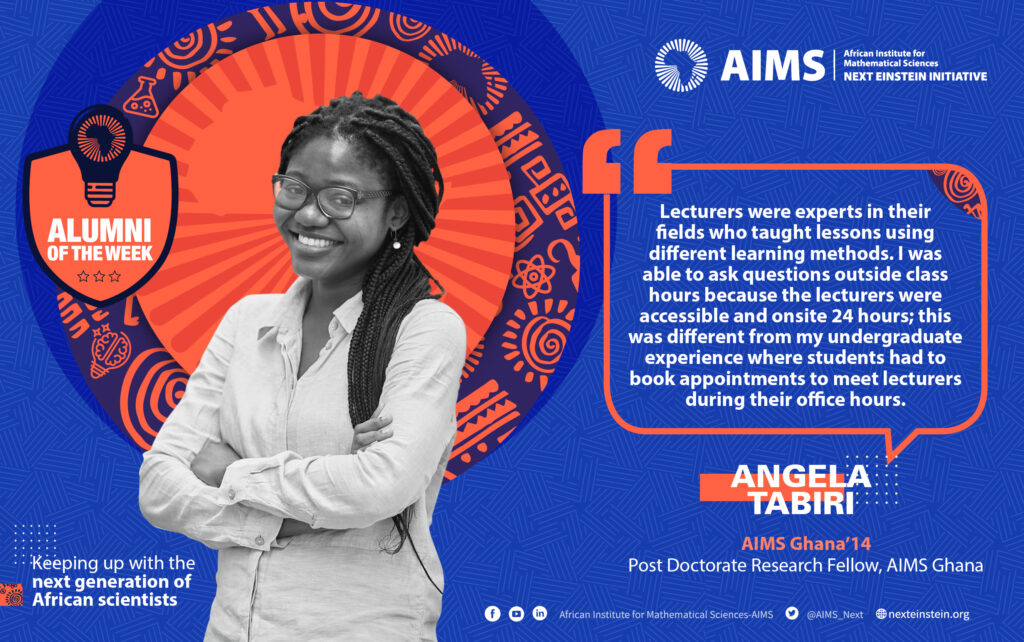In this week’s edition of our #AlumoftheWeek series, we dive into the post-AIMS journey of alumna extraordinaire Angela Tabiri. Founder of Femafricmaths, an NGO which promotes female African mathematicians, Dr. Angela Tabiri graduated from AIMS Ghana in 2014.
Q: Tell us about your academic life before AIMS.
Angela: My undergraduate degree was in mathematics and economics. I found mathematics challenging but found joy in preserving it until I was able to solve problems. Though I loved mathematics as an undergraduate student, I was not sure whether to pursue a career in mathematics or not. Therefore, I chose to study at AIMS Ghana to be exposed to diverse mathematics fields to decide whether I could pursue further studies in mathematics.
Q: How would you describe your time at AIMS?
Angela: I chose to study at AIMS because of the dynamic learning experience and environment. Lecturers were experts in their fields who taught lessons using different learning methods. I was able to ask questions outside class hours because the lecturers were accessible and onsite 24 hours; this was different from my undergraduate experience where students had to book appointments to meet lecturers during their office hours. In addition, the AIMS centre was far from home and the city, which provided a serene environment for studying.
I enjoyed long walks along Biriwa beach to Anomabo with my colleagues on Sundays. We would sometimes swim and relax at Anomabo with coconut freshly plucked from the tree.The highlight of my stay at AIMS was when I realized that I loved abstract algebra and decided to pursue further studies in it.
Q: Tell us about the impact AIMS has had on you.
Angela: At AIMS, my knowledge and skills in mathematics improved immensely, giving me an excellent foundation to enrol in a PhD program.Before AIMS, I had no training in programming, but after the skills phase, I learnt to code in Python. Communication was key in the training at AIMS. We had training in presenting assignments typed in Latex with clear mathematical arguments, presenting on topics using Beamer slides and confidently communicating verbally. In my current job, I engage in science communication to demystify the research outputs so the general public can understand.
Teamwork and collaborations are critical during training at AIMS. Students are given group assignments to enable them to collaborate to solve problems. This is an important skill I learnt at AIMS which I find helpful as a postdoc and is relevant to my current research projects with collaborators.
Q: Which of the SDGs is most important/relevant to you? How do you plan on addressing it in your work?
Angela: The SDG 4 (Quality Education) and SDG 5 (Gender Equality) are most important.I am the lead for the Girls in Mathematical Sciences Program (GMSP) at AIMS Ghana. The goal of the GMSP is to nurture the talents of secondary school girls from Ghana to unlock their potential in the mathematical sciences. In ten years, the GMSP alumni will be leading scientific research and innovation in Africa and winning international medals in their respective fields in the mathematical sciences. The program’s first cohort is made up of 35 students, and they were enrolled in November 2020. Through online masterclasses, mini-courses, industrial visits and mentoring, GMSP students benefit from quality education which will improve the representation of women and girls in STEM fields.
Also, I am the founder of Femafricmaths, an NGO which promotes female African mathematicians. Our mission is to inspire young people about the diverse career options available when they study mathematics. Our vision is to see girls being confident to take up careers in mathematics-related fields. “Y3p3math”, literally translated as “We like Maths”, is one of our projects at Femafricmaths that provides one-on-one support services in mathematics to students in junior high schools. Before the COVID-19 pandemic, we met students physically on Sunday afternoons for this project. Though physical contact is on hold because of the pandemic, we have recorded lessons online on the Femafricmaths YouTube and Facebook pages.
We also interview female African mathematicians about their journeys so girls across Africa will be inspired by diverse career options when they study mathematics. Interview videos are available on the Femafricmaths pages on YouTube, Facebook, Instagram and Twitter.
Q: What would you describe as your post-AIMS success story?
Angela: At AIMS Ghana, I met my Master’s thesis supervisor, Ulrich Kraehmer, who became my PhD supervisor. In June 2019, when I graduated with a PhD in Mathematics from the University of Glasgow, it was an honour for my PhD supervisor and me. Ulrich was proud to see his AIMS student graduate with a PhD in mathematics and return to her home country to support the teaching and learning of mathematics. I am now a postdoc at AIMS Ghana, teaching in different programs and leading the Girls in Mathematical Sciences Program.
In the next few years, I hope to increase my research output and collaborate more with researchers in Africa and beyond. In addition, my current outreach activities at Femafricmaths should see more girls in Africa being confident to pursue careers in mathematics-related fields.
Q: What is your message to current AIMS students and young people across the continent?
Angela: Dream beyond your surroundings. Believe in your dream and find mentors who believe in this dream. These mentors will nurture and support you. Then, take action to transform your dreams into reality.

